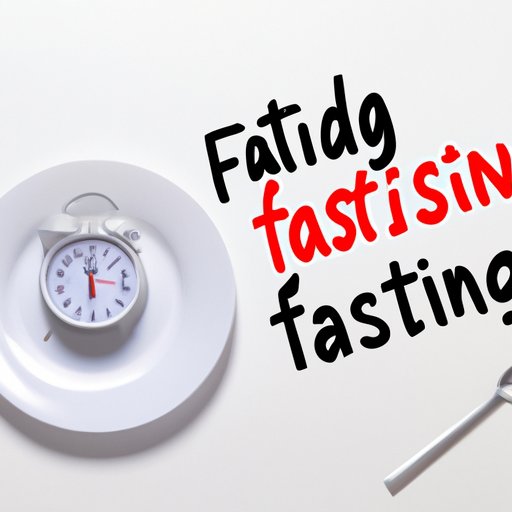
I. Introduction
Fasting has been gaining popularity as a way to boost health and wellness. People are using various fasting approaches with the aim of losing weight, improving their health, and enhancing their longevity. But how long should you fast? This is a common question that comes up when it comes to fasting. In this article, we aim to provide a comprehensive answer to this question.
II. The Benefits of Intermittent Fasting: Why Shorter Fasting Periods Might Be Better for You
Intermittent fasting is a way of eating that involves timing your meals to alternate between periods of fasting and eating. This eating pattern has been found to have several benefits, including a reduction in inflammation, improved insulin sensitivity, and weight loss.
Studies have shown that shorter fasting periods may be more effective and sustainable for most people. According to a study published in the International Journal of Obesity, the 16/8 approach (fasting for 16 hours and eating within an 8-hour window) was found to be more effective for weight loss and glycemic control than other forms of intermittent fasting.
III. How Long Should You Fast for Optimal Health? A Guide to Finding the Right Balance
When it comes to fasting, it’s important to find a plan that works for you. The fasting length that works for one person may not necessarily work for another. Factors to consider when determining the ideal length for you include:
- Your weight goals
- Your overall health
- Any medical conditions
There are different fasting protocols, including:
- The 16/8 approach
- Alternate-day fasting
- One meal a day (OMAD) fasting
- Extended fasting (more than 24 hours)
The length of time that you choose to fast will depend on the above factors, as well as your personal preference and lifestyle.
IV. The Dangers of Prolonged Fasting: Why You Shouldn’t Fast for Too Long
While shorter fasting periods can be beneficial, prolonged fasting can be dangerous and even life-threatening. Prolonged fasting is defined as fasting for more than 24 hours to several days or weeks.
The main risks of prolonged fasting include:
- Malnutrition
- Muscle loss
- Fatigue and weakness
- Electrolyte imbalances
It’s essential to observe health precautions and seek professional guidance if you plan to do prolonged fasting. If you have any underlying medical conditions, it’s crucial to speak with your healthcare provider before starting any prolonged fasting regime.
V. The Science Behind Fasting: How Long Do You Need to Fast to Achieve Your Health Goals?
There is compelling research suggesting that fasting has various health benefits. The duration of the fast may vary depending on the desired health outcome. Some of the health benefits of fasting include:
- Reduced inflammation
- Enhanced cellular function
- Better brain function
- Improved insulin sensitivity
A study published in Cell Metabolism showed that intermittent fasting could activate autophagy (cell cleanup and repair process) between 16 and 24 hours of fasting. Another study found that fasting for 24 hours led to improved cognitive function and creative thinking.
VI. Finding Your Fasting Sweet Spot: Tips for Figuring Out How Long to Fast Based on Your Individual Needs and Lifestyle
The optimal fasting length for you will depend on various factors, including your age, physical activity, sleep patterns, and more. Here are some tips to help you find your fasting sweet spot:
- Start slow: If you’re just starting, try shorter fasts before advancing to longer ones.
- Listen to your body: Pay attention to how you feel during the fasting period. Stop if you experience any adverse effects.
- Break your fast slowly: When breaking your fast, start with small, easy-to-digest meals, and gradually work up to larger meals.
- Stay hydrated: Drink plenty of water during your fasting period to avoid dehydration.
For a personalized fasting plan, you may consider consulting a nutritionist or healthcare provider.
VII. Conclusion
Fasting can be an effective way to boost your health and well-being. However, there is no one-size-fits-all approach when it comes to fasting. How long you fast should depend on your individual needs and lifestyle. It’s essential to find a fasting protocol that works for you, stick to it, and seek medical guidance if you plan to do prolonged fasting.
Remember, the goal is optimal health and well-being, and what works for one person may not necessarily work for another.




